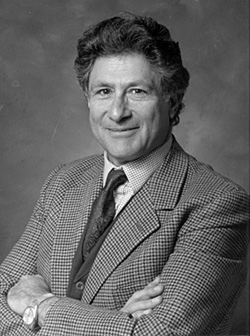|
|
 |
 |
 |
 |
|
AROUND THE QUADSIN MEMORIAM: University Professor Edward Said
University Professor Edward Said, an acclaimed scholar and teacher, died on September 24 in New York City. A pioneering literary critic and theorist who is recognized as a founder of postcolonial studies, Said also was a prominent advocate in the United States for Palestinian causes. Said, who succumbed to the leukemia that he had fought for many years, was 67. “Edward Said was a man of enormous intellectual distinction. He was devoted to, and intimately engaged with, works of art, especially the novel and the poem. He was a humanist who believed that such study is essential to a good and meaningful life,” said University President Lee C. Bollinger. “His death is an irreplaceable loss to the realm of ideas and for those who believe in the redemptive power of the life of the mind.” Provost Alan Brinkley remembered Said as “a great scholar, a great teacher and a beloved member of the Columbia community for 40 years. His many works on literature, theory, music and politics have influenced generations of students and teachers around the world.” Said was born in West Jerusalem — then part of British-ruled Palestine — on November 1, 1935, to parents who resided primarily in Cairo but traveled regularly between the cities. At 12, he went to the American School in Cairo, then to the elite Victoria College. In 1951, he came to the United States to study, attending the Mount Hermon School in Massachusetts and then Princeton, where he received his B.A. in 1957. He earned his M.A. and Ph.D. at Harvard in 1960 and 1964, respectively. Said joined Columbia’s Department of English and Comparative Literature that year and became a full professor in 1970. In 1977, he became the Parr Professor of English and Comparative Literature and later was named the Old Dominion Foundation Professor in the Humanities, a position he held until he was appointed University Professor in 1992. As a teacher, Said noted of his time at Columbia: “I’ve never been happier. [It] presents a fantastically challenging group of students.” Said’s first book was Joseph Conrad and the Fiction of Autobiography (1966). He established himself as a leading literary critic and public intellectual with the publication of Beginnings (1975), which won the Lionel Trilling Award in 1976, and the celebrated Orientalism (1979). In his writings, Said dissected Western portrayals of non-Western cultures and challenged readers to recognize implicit political ramifications within texts and the institutional powers that shape literary assumptions. His concepts of “worldliness” and “contrapuntal criticism” have been central to postcolonial theory and influenced conceptions of race and ethnicity. Said wrote more than 20 books as well as numerous articles, book introductions and forewords on literature and literary theory as well as on art, music (a skilled pianist, he was the music critic for The Nation for several years) and Palestinian causes. His other books include The World, the Text and the Critic (1984), Musical Elaborations (1991), Culture and Imperialism (1993), Out of Place: A Memoir (1999), Reflections on Exile & Other Essays (2001), Power, Politics and Culture (2001) and Freud and the Non-European, which was published in April. Said’s works have been translated into 36 languages. Said’s activism on behalf of Palestinian independence brought him both fame and notoriety. A frequent participant in debates on the Middle East, he was a member of the Palestinian National Conference, a parliament-in-exile, for 14 years until stepping down in 1991, when he was diagnosed with leukemia. In 1988, he helped draft a new Palestinian constitution. Said broke with Yasser Arafat in 1994, becoming a fierce critic of the P.L.O., which he said lacked credibility and moral authority. He condemned the 1993 Oslo peace accords, saying they didn’t give the Palestinians enough territory or control. He also criticized America’s role in the Mideast peace process because of the United States’ long-standing support for Israel. In recent years, Said became convinced that creating separate Palestinian and Jewish states wasn’t a workable solution, and he advocated a single, bi-national solution. Although Said spent most of his career at Columbia, he also taught at Harvard, Johns Hopkins, Yale and Chicago. In 1999, he served as president of the Modern Language Association. He was a member of the Council on Foreign Relations, a senior fellow of the School of Criticism and Theory and a member of the American Academy of Arts and Sciences, the American Philosophical Society, the Royal Society of Literature and King’s College, Cambridge, and was an honorary fellow of the Middle East Studies Association. He received honorary doctorates from Bir Zeit, Chicago, Michigan, Jawaharlal Nehru, Jami’a Malleyeh, Toronto, Guelph, Edinburgh, Haverford, Warwick, Exeter, the National University of Ireland and the American University in Cairo. Michael Rosenthal, the Roberta and William Campbell Professor of the Humanities and Said’s friend for 40 years, told Spectator: “He was passionately involved in the world in every way — politically, literarily, psychologically. He had a wonderful, wide-ranging curiosity. He loved literature, he loved music, he was interested in sports … He was full of humor; he had a wonderful sense of irony.” Said is survived by his second wife, Mariam Cortas; son, Wadie; and daughter, Najla. A memorial service will be scheduled. T.P.C., L.P.
|
|
||||||||||||||||||||||||||||||||||||||||||||||||||||||||||
